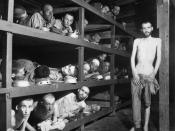"We must always take sides. Neutrality helps the oppressor, never the victim. Silence encourages the tormentor, never the tormented." That quote is from Elie Wiesel in his Nobel Peace Prize Speech. I agree with the quotation. In the story Night by Elie Wiesel, many elements correspond to the quote and to the idea of silence and complicity. Wiesel says in his book that many different people were silent because they were not directly affected by the Holocaust, and thought that if they did something to try to stop it, then they themselves would get hurt. He also explained how people like Moshe the Beadle and other characters in Night who were humiliated by fellow Jews did not believe that the Holocaust was occurring. Overall, the Jews, God, and the German citizens were all silent during the Holocaust. Their silence encouraged the Nazis to gain strength and reach the magnitude of eventually massacring six million Jews.
"I did not move. I was afraid," (37) said the character Eliezer in Night. That quote refers to when his father is beaten at the concentration camp and Eliezer just stood there watching it and doing nothing to stop it. The setting of the story Night takes place in a small town of Transylvania in 1941. To this day Wiesel still feels guilty about his inaction. The silence of the victims and the lack of resistance to the Nazi threat is one way in which neutrality and silence helps the tormentors, or in this case the Nazis and never the victims who were the Jews. Even when Eliezer was being led to the fire pit and thought he was going to die, he did not try to run or escape. In the concentration camps, the Jews greatly outnumbered the Nazi soldiers. Maybe if they...


